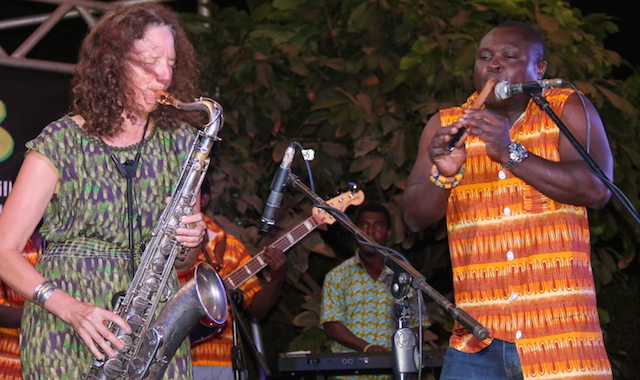![]()

The ‘atenteben’ punching above its weight
This year’s Copenhagen Jazz Festival (Winter Edition) ended in Denmark on Sunday,(27-02-2022) and a regular feature at the programme over the last few years had been Danish saxophonist, Katrine Suwalski’s Another World band playing with Ghanaian atenteben (locally made bamboo flute) player, Dela Botri.
Suwalski and Botri have played together on other occasions in Ghana and the United Kingdom.
Advertisement
Each time, the atenteben played distinctive melodic phrases which evoked admiration, mainly because people don’t often expect that sort of fluency from the notched bamboo instrument.
The atenteben is a lightweight, affordable and easily available instrument that has made its presence strongly felt in contemporary music settings.
In boxing terms, one would say it is punching above its weight because it is engaged in an activity or contest perceived as being beyond its capabilities.
Use of atenteben
Nowadays, it is quite common to see the atenteben being employed in contemporary settings. It is often in full flight at several live music venues in the nation’s capital and other places across the country.
For instance, Kwesi Ansong has jammed on atenteben with his son, Richmond’s band at the Jamestown Boutique and other social engagements.
One can catch percussionist Vida Feehi Ofoli of the all-women Lipstick band doubling on atenteben with her group at the +233 Jazz Bar & Grill or see saxophonist Dela Jackson switching to atenteben from time to time with his Breeze band at the Fridays Club and other places.
The late Dr Ephraim Amu probably never guessed what contexts the atenteben would find itself decades after he transformed it from a transverse instrument into a vertical one. He worked hard to generally develop the instrument and its playing techniques.
The atenteben was one of the few local instruments for which a notated music tradition had already been established in the 1950s through Dr Amu’s pioneering work.
Other musicians who wrote music specifically for the atenteben included Prof. Ata Atta Annan Mensah and Prof. J. H. Nketia.
Atenteben classics
Compositions by Dr Amu such as ‘Prelude for Atenteben and Piano,’ ‘Pipes and Drums’, ‘Pipe Trio’ and ‘Miato Agblemaa’ as well as Prof.
Nketia’s pieces such as ‘Quartets No.1&2’, ‘Work Song’ and ‘Ananse Theme’ are now revered classics as far as atenteben music is concerned.
Another musician who paid serious attention to the atenteben was the late Nana Danso Abiam who founded the Pan-African Orchestra (PAO) in 1988.
As a researcher at the Institute of African Studies at the University of Ghana, Legon in the late 1970s, Abiam carefully studied the instrument and came up with a manual titled ‘Abiam’s Atenteben Tutor – Grade One.’
In his research dissertation, Abiam formally laid out his findings in atenteben acoustics and introduced a new fingering technique that for the first time, transformed the atenteben from a heptatonic instrument to a chromatic type.
The research largely focused on the technical capabilities of the instrument such as playing mechanism, tuning, limitations and how to teach it to learners.
The Institute of African Studies referred Abiam’s dissertation to Dr Amu for his assessment and judgement of the manuscript.
Amu invited Abiam to his home at Peki-Avetile in the Volta Region to defend his dissertation and demonstrate the fingering technique which he claimed to have invented.
The first meeting led to a few other ones at Peki-Avetile between Dr Amu and Abiam. In December 1980, Dr Amu wrote a letter to the Institute of African Studies endorsing the newness and efficacy of Abiam’s technique. He noted that he was ‘thrilled’ by the new technique.
Players
Abiam paid special attention to the atenteben section of his PAO. Eventually, it turned out wonderful players such as Boateng Kodua Acheampong, Nii Mensah Yemoh, Yaw Ayisi, Kwesi Ansong, Zorkie Nelson, Yaw Asumadu, Kweku Kwakye and Dela Botri.
After leaving the PAO, Boateng played with a variety of musicians in the areas of Highlife, Reggae, Afro-beat Jazz and Blues.
He later led bands such as La Ko Edze, Ntrama and Gonje which experimented with various strands of African music.
Boateng is even able to play two atentebens at the same time and harmonise different melodies from them in the same key. It is his conviction that African instruments can always play alongside the Western ones in popular music.
Atenteben vs Western instruments
“If Indian instruments like the tabla and sitar fit well alongside Western instruments, why can’t our own also do same?” Boateng asks.
To him, all it takes is the courage to go out there and show that the African instrument can fit in and even add textures one cannot derive from conventional Western equipment.
“It can be quite intimidating holding only a bamboo flute and surrounded by trumpets, saxophones and trombones.
"You can, however, gain respect when you play and convince people that it is what you get out of your instrument and not how big or shiny it is,” says Boateng who is also fluent on the wia flute from the northern part of this country.
Lead instrument
Botri leads the Hewale Sounds and his piercing atenteben is the group’s real identification sound.
He has held workshops and played the instrument in several countries including the United States, Niger, Cuba, Denmark, Finland, Togo, Benin, Nigeria, Mali, Mauritania, Guinea, Norway, Jordan, United Arab Emirate, South Africa and Egypt.
The pioneering sound of the Wulomei in the 1970s was characterised by Nii Tei Ashitey’s atenteben. Though he was more known as a player of the osrama drum, he also played the atenteben. Nearly all groups that came up later in the Wulomei mode included the atenteben in their set-ups.
A player who created a unique voice for the atenteben was guitarist and singer, Mawuli Nukpese. He delectably incorporated the instrument into the band’s Afro-reggae repertoire.
A catchy track on the group’s ‘Civilisation’ album is called ‘Atenteben Dub.’
The atenteben has definitely come a long way and still seriously punching above its weight in the popular music arena.